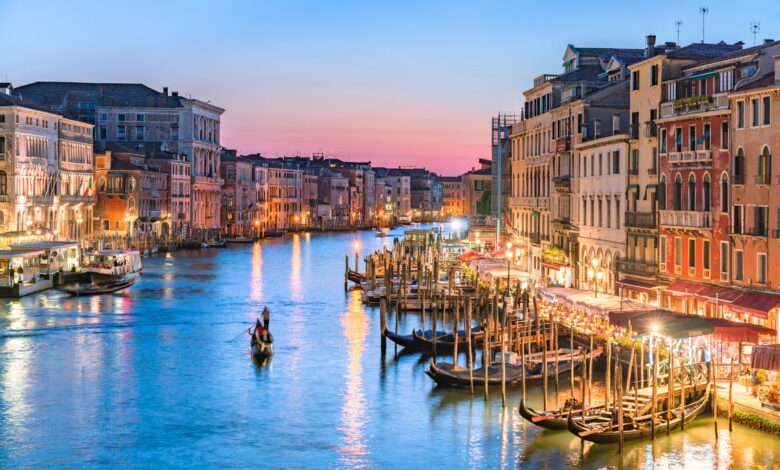Tourism taxes are making international trips more expensive

As you budget for a trip, the list of expenses to consider is long. Sure, there are the big-ticket costs, from airfare to lodging to theme park tickets to car rentals, but as every traveler knows, that’s often just the beginning. Airline fees, resort charges, food, souvenirs, highway tolls and other extras drive up the overall cost of a trip.
Increasingly, travelers have also had to take another extra into account: tourism taxes.
The ever-popular tourist destination of Venice, Italy, recently made headlines by announcing its long-discussed tourist tax is being implemented starting in 2024. The city will charge daytrippers about 5 euros ($5.35) on certain peak days.
And Venice isn’t alone.
Depending on the destination, you may find tourism taxes or similar fees tacked onto your hotel bill or charged upon arrival.
Sure, they’re typically not large enough to make you consider altering your travel plans. However, they are another line to add to your trip budget, whether you’re heading to a hotel in the U.S. or abroad to places like Manchester, England; Barcelona; the Balearic Islands; and New Zealand.
And more places may charge them soon.
Passing costs on to tourists
Governments have long sought to pass costs on to tourists in some form or another.
The amount you pay for most hotel rooms in the U.S., for instance, usually includes the kind of additional tax beyond what you’d pay for a purchase at a retailer.

Daily Newsletter
Reward your inbox with the TPG Daily newsletter
Join over 700,000 readers for breaking news, in-depth guides and exclusive deals from TPG’s experts
Last summer, while on assignment for TPG in New York, I saw a $38 charge for various city and state taxes (totaling 17% of the rate) on top of my $219 room rate at the Moxy Times Square. That was in addition to the hotel’s $30 destination fee.
You’ll find this setup all over the world … and it’s been around for years.
The city of Amsterdam, for instance, charges a 7% fee on hotel rooms, along with 3 euros (a little more than $3) per person, per night.
In Paris, how much you pay in room tax depends, more or less, on how nice the hotel is. The fees top out at around $4 per night for a luxury hotel or similar accommodations; it may be something to keep in mind as you consider booking accommodations for the 2024 Olympics next summer.
Earlier this year, Manchester became the first city in the United Kingdom to charge a tourism tax; visitors staying in city center hotels or at rental properties pay 1 British pound ($1.22) per night.
Extra charges beyond hotels
In recent years, tourist payments have grown to include not just taxes on airfare or hotel stays but also stand-alone fees for merely visiting the destination itself.
Bhutan may be the most notable. The country charges a flat rate of $200 or more per day. You get a lot for your money, though: Decent lodging, meals, ground transportation, camping equipment and a tour guide are included.
Most tourist fees are considerably smaller. For example, visitors from most countries pay about $24 upon entering New Zealand as part of its International Visitor Conservation and Tourism Levy.
ETIAS starts in 2024
Starting at some point in 2024, U.S. and U.K. travelers will be among those required to fill out an application and pay a small fee of around 7 euros ($7.41) to enter any European Union or Schengen Area country for up to 90 days as part of the European Travel Information and Authorisation System.
Though not particularly expensive compared to the cost of flying to Europe, it’s also, as they say, “not nothing.”
A family of four would pay nearly $30 in ETIAS fees — money that might otherwise be spent on a souvenir or a post-dinner family trip to get gelato.
Why are so many places adding tourism taxes?
There are a variety of reasons cities, regions and countries are adding these taxes and fees.
EU leaders have billed the addition of ETIAS as a security step geared toward securing the region’s borders.
Infrastructure is a big part of it, too. Tourists strain the environment, from creating trash to using city services, riding public transportation and crowding streets in popular destinations.
In Wales, the government is considering allowing nightly visitor levies of between 0.5 and 5 pounds (61 cents to $6.10) per night; officials say any taxes “will generate revenue to support investment in the tourism industry.”
Last year, New Zealand’s tourism minister hinted that increases to the country’s tourism tax may come after noting pre-coronavirus pandemic tourism levels were “unsustainable.” This is the same word a 2019 Cornell University report used about the “extremely rapid growth” of tourism in Southeast Asia.
Elsewhere, the motivation has much to do with the impacts of climate change.
In Hawaii, the state has discussed imposing a $50 fee on visitors using state-owned hiking, fishing and other outdoor tourism areas. The discussion follows Gov. Josh Green’s campaign for a “climate impact fee” — with the impacts of climate change especially poignant following the Maui wildfires in August.
A 2022 report from the World Travel & Tourism Council, published just as travel began to bounce back from the pandemic, stressed the importance of a “renewed commitment and interest” from travelers “to preserving our planet and the people and communities who are a part of it.”
Then there’s Venice. Leaders pointed to massive tourist numbers in recent years as underscoring the need for the upcoming changes as the city contends with its place on UNESCO’s list of endangered World Heritage Sites.
“The goal is to find a new balance between the rights of those who live and work in Venice and those who intend to visit the city,” said Gabriele Vattolo, the city’s press secretary, in a statement to TPG.
Bottom line
Out-of-town guests have long been asked to support the communities they’re visiting in the form of taxes added to the top of nightly hotel bills.
As travel has surged over the last two years in the wake of the pandemic, it seems cities — and, indeed, countries — are increasingly looking to have visitors help pay for the costs (both financial and environmental) that tourism incurs.
With that in mind, you’ll want to factor these added costs into your next trip budget on top of the pricier expenses you’re already considering, such as airfare and the advertised hotel rate.
And, as always, if paying these tourism fees with a credit card is an option (and won’t cost you more in processing fees), select the card in your wallet that doesn’t have foreign transaction fees and earns you the most rewards on everyday expenses. This will be your best bet to get something back for your purchase.
Related reading:




